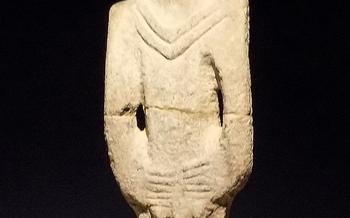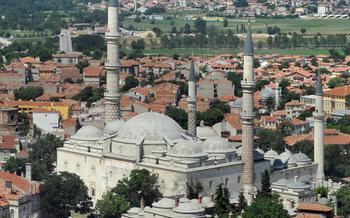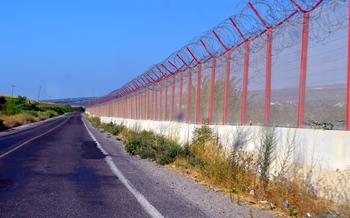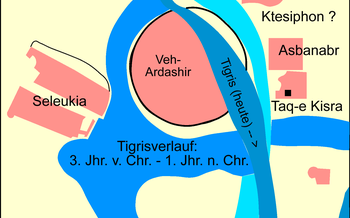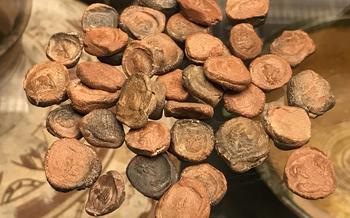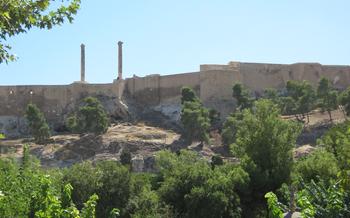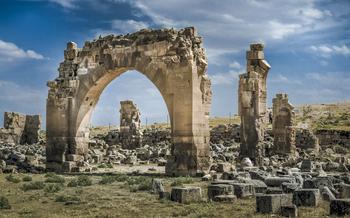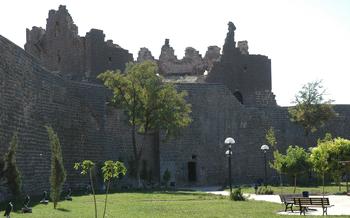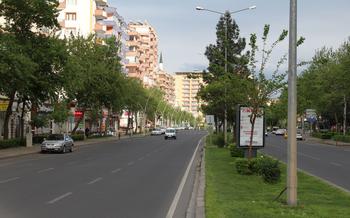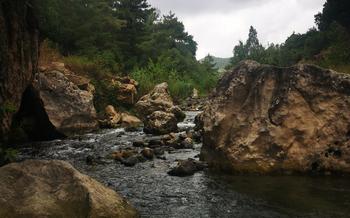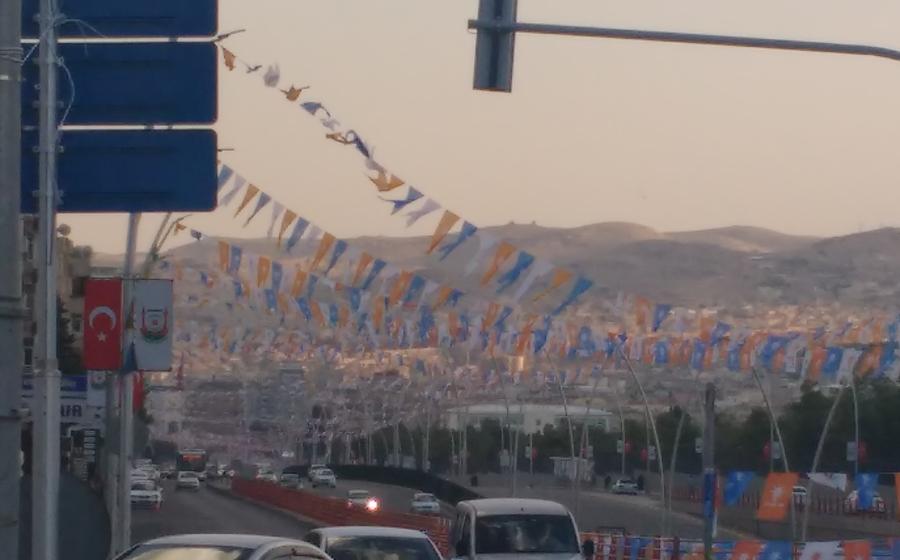
Sogmatar Ancient City
- A Journey Through Time: Exploring the Ancient City of Sogmatar
- Sogmatar Ancient City:
- Getting to Sogmatar
- Entrance Fees and Opening Hours:
- Guided Tours:
- Exploring the City Ruins
- Mosaics and Inscriptions:
- Temple of Zeus: A Majestic Symbol of Ancient Religion
- Theater
- Museum
- Local Cuisine: A Culinary Journey in Şanlıurfa
- Shopping
- Insider Tip: Unveiling the Secrets of the Underground City
A Journey Through Time: Exploring the Ancient City of Sogmatar
Şanlıurfa, a city in southeastern Turkey, boasts a rich history that dates back to the Neolithic period. Located in the heart of the Fertile Crescent, this ancient city has witnessed the rise and fall of numerous civilizations, each leaving its mark on the city's cultural and architectural landscape.
Şanlıurfa's strategic location on the Silk Road, a network of trade routes connecting the East and the West, played a pivotal role in its development. The city thrived as a major trading center, facilitating the exchange of goods, ideas, and technologies between diverse cultures.
Over the centuries, various empires, including the Romans, Byzantines, and Ottomans, ruled over Şanlıurfa, leaving behind a legacy of architectural wonders and cultural influences. The city's unique blend of cultures and religions has shaped its identity, making it a fascinating destination for travelers seeking to explore the depths of history and cultural diversity.
Sogmatar Ancient City:
Nestled approximately 30 kilometers from the bustling city of Şanlıurfa, the Sogmatar Ancient City stands as a testament to the rich history and cultural heritage of the region. Believed to have been founded in the 2nd century AD, Sogmatar played a significant role as a strategic trading hub on the trade routes connecting the Mediterranean with Mesopotamia. Over the centuries, the city witnessed the rise and fall of various civilizations, including the Romans, Byzantines, and Ottomans, each leaving their unique imprint on its development.
Ongoing archaeological excavations are continuously shedding light on Sogmatar's captivating past. Discoveries of ancient artifacts, intricate mosaics, and well-preserved structures have provided valuable insights into the city's daily life, religious practices, and architectural achievements. As you explore the ruins of this once-thriving metropolis, you'll be transported back in time, experiencing the grandeur and significance that Sogmatar held in ancient times.
Getting to Sogmatar
Reaching Sogmatar from Şanlıurfa is a breeze, with several convenient transportation options available. Public buses depart regularly from the city's main bus station, offering a budget-friendly and direct route to the ancient city. The journey takes approximately 30 minutes and costs around 10 Turkish Lira. For a more personalized experience, private tours can be arranged through local travel agencies or online platforms. These tours typically include transportation, a knowledgeable guide, and additional stops at other nearby attractions. Expect to pay around 150 Turkish Lira for a half-day tour.
If you prefer the freedom and flexibility of self-driving, car rental services are readily available in Şanlıurfa. The drive to Sogmatar takes about 40 minutes, and the roads are generally well-maintained. Rental costs vary depending on the type of vehicle and the duration of the rental period, but you can expect to pay around 200 Turkish Lira per day. Once you arrive in Sogmatar, ample parking is available near the entrance of the ancient city.
Entrance Fees and Opening Hours:
Visiting the Sogmatar Ancient City requires an entrance fee that varies depending on the type of visitor. Adults pay a standard fee, while students, seniors, and groups may be eligible for discounted rates. It's advisable to carry valid identification to avail of any concessions.
The site is open to the public during specific hours, typically from 8 am to 5 pm. However, these hours may vary seasonally, so it's best to check in advance to avoid disappointment.
To make the most of your visit, plan your trip during the shoulder seasons (spring and autumn) when the weather is pleasant, and there are fewer crowds. This allows you to explore the ruins at a more leisurely pace and capture stunning photographs without distractions.
Guided Tours:
Enhancing your visit to Sogmatar Ancient City is the option of joining a guided tour. These tours offer an immersive experience, providing in-depth knowledge and insights into the city's history, culture, and significance. Knowledgeable guides will lead you through the ruins, explaining the architectural features, religious beliefs, and daily life of the ancient inhabitants. Guided tours are available in various languages, ensuring accessibility for international visitors. Prices typically range from 50 to 100 Turkish Lira, depending on the group size and duration of the tour. Booking in advance is recommended to secure your spot, especially during peak tourist season. Reputable tour operators and local guides can be found online or through your hotel concierge. By opting for a guided tour, you'll gain a deeper understanding and appreciation for the wonders of Sogmatar Ancient City, making your visit truly unforgettable.
Exploring the City Ruins
As you step into the ancient city of Sogmatar, you'll be greeted by an array of impressive ruins that tell the story of its rich past. The city's layout is organized around two main streets, lined with the remains of shops, temples, and residential buildings.
Among the most notable ruins is the theater, a marvel of ancient architecture that could accommodate up to 5,000 spectators. Its well-preserved stage and seating areas offer a glimpse into the city's vibrant cultural life.
Another significant landmark is the Temple of Zeus, dedicated to the Greek god Zeus. Its grand columns, elaborate friezes, and intricate carvings stand as a testament to the city's religious devotion.
Don't miss the opportunity to explore the city's fortifications, which once protected Sogmatar from invaders. These towering walls, gates, and towers offer a glimpse into the city's strategic importance and its ability to withstand sieges.
As you wander through the ruins, keep an eye out for the exquisite mosaics and inscriptions that adorn the streets and buildings. These intricate artworks provide valuable insights into the city's artistic heritage and the daily lives of its inhabitants.
To capture the essence of Sogmatar's ancient ruins, be sure to bring your camera and tripod. The golden light of sunrise and sunset casts a magical glow on the ruins, creating the perfect opportunity for stunning photographs.
Mosaics and Inscriptions:
Sogmatar is renowned for its exquisite mosaics and inscriptions, which provide a glimpse into the city's rich artistic and cultural heritage. These intricate artworks adorn the floors and walls of various buildings, showcasing a diverse range of themes and motifs. Geometric patterns, mythological scenes, and religious symbols are commonly depicted, offering insights into the beliefs, customs, and daily life of the ancient population.
One of the most notable mosaics is the "Head of Medusa" mosaic, discovered in the city center. This stunning portrayal of the mythical Gorgon features a mesmerizing gaze and intricate serpentine hair, showcasing the exceptional skill of the ancient mosaicists.
Another highlight is the "Four Seasons" mosaic, which depicts each season personified by a different deity. The vibrant colors and detailed representations of the seasons provide a glimpse into the agricultural and seasonal cycles that shaped the lives of the Sogmatar inhabitants.
In addition to mosaics, visitors can also find inscriptions in various languages, including Greek, Latin, and Aramaic. These inscriptions provide valuable historical information, shedding light on the city's administration, trade relations, and religious practices.
Exploring the mosaics and inscriptions of Sogmatar is a captivating experience that transports visitors back in time, allowing them to connect with the artistic and intellectual achievements of this ancient city.
Temple of Zeus: A Majestic Symbol of Ancient Religion
At the heart of Sogmatar, the Temple of Zeus stands as a testament to the city's religious devotion and architectural prowess. Dedicated to the king of the Greek gods, this awe-inspiring structure once reverberated with the prayers and rituals of the ancient population.
The temple's imposing presence is undeniable, with its grand columns reaching towards the heavens and intricate friezes adorning its facade. The intricate carvings depict scenes from Greek mythology and religious ceremonies, offering glimpses into the beliefs and practices of Sogmatar's inhabitants.
Step inside the temple, and you'll be transported back in time to a world of devotion and reverence. The altar, where offerings were once made to Zeus, stands as a silent witness to the city's spiritual fervor. The acoustics within the temple are remarkable, amplifying even the slightest whisper, creating an atmosphere of sacred resonance.
As you explore the temple grounds, imagine the ancient priests performing rituals, the faithful offering prayers, and the community gathering for religious festivals. The Temple of Zeus is not just a historical relic; it's a tangible connection to the spiritual beliefs that shaped Sogmatar's identity.
Theater
Sogmatar's theater is an impressive architectural marvel that transports visitors back to the days of ancient performances and public gatherings. Constructed with remarkable precision, the theater features a spacious seating area capable of accommodating a substantial audience. Its acoustics are exceptionally well-designed, ensuring that every word spoken on stage can be heard clearly throughout the venue.
The stage itself is a testament to the artistic prowess of the ancient builders. Intricate carvings and decorative elements adorn the backdrop, creating a visually captivating setting for performances. The theater served as a hub for entertainment, where plays, musical performances, and public speeches took place, fostering a vibrant cultural atmosphere within the city.
Imagine yourself sitting among the ancient spectators, immersed in the captivating performances that once graced this stage. The theater in Sogmatar is not just a historical site but a tangible connection to the vibrant cultural heritage of this ancient city.
Museum
The museum in Sogmatar is a treasure trove of artifacts and findings that shed light on the rich history and culture of the ancient city. As you step inside, you'll be greeted by a diverse collection of pottery, jewelry, sculptures, and inscriptions, each telling a story of the city's past.
One of the highlights of the museum is the collection of pottery. From intricate bowls and plates to decorative vases and jars, these pieces showcase the artistry and craftsmanship of Sogmatar's ancient inhabitants. Admire the intricate designs and vibrant colors that adorn these ceramic works, offering a glimpse into the daily life and artistic traditions of the city.
Another must-see exhibit is the collection of jewelry. From delicate necklaces and earrings to ornate bracelets and rings, these pieces showcase the exquisite craftsmanship and love of adornment that characterized Sogmatar's society. Discover the symbolism and cultural significance behind each piece, as they reflect the beliefs and customs of the ancient population.
Don't miss the collection of sculptures, which bring to life the religious and mythological beliefs of Sogmatar's inhabitants. From imposing statues of gods and goddesses to intricate carvings depicting scenes from mythology, these sculptures offer a glimpse into the spiritual and artistic world of the ancient city.
Finally, the museum houses a collection of inscriptions that provide valuable insights into the history and culture of Sogmatar. From royal decrees and building inscriptions to religious texts and funerary stelae, these inscriptions offer a written record of the city's past. Study the carefully carved letters and decipher the messages they hold, gaining a deeper understanding of the ancient civilization that once thrived in this region.
Local Cuisine: A Culinary Journey in Şanlıurfa
Şanlıurfa is a culinary paradise, renowned for its delectable dishes and diverse flavors that have been shaped by centuries of cultural influences. The city's cuisine is a harmonious blend of Turkish, Kurdish, and Arabic traditions, resulting in a rich culinary tapestry that tantalizes the taste buds.
One of the must-try dishes in Şanlıurfa is the legendary kebab, which has gained international fame for its succulent and smoky taste. Perfectly grilled meats, seasoned with aromatic spices and herbs, are skewered and cooked to perfection over hot coals, creating an irresistible symphony of flavors.
Another local delicacy is lahmacun, a thin and crispy flatbread topped with minced meat, vegetables, and herbs. This savory delight is often enjoyed as a quick and satisfying meal, accompanied by a refreshing glass of ayran, a traditional yogurt drink.
For those who prefer a vegetarian option, çiğ köfte is a must-try. This dish consists of finely ground bulgur, mixed with tomatoes, onions, garlic, and spices, resulting in a tangy and flavorful salad that is often served with fresh herbs and lemon wedges.
Şıllık, a hearty and comforting soup, is another culinary gem of Şanlıurfa. Slow-cooked with lamb or beef, chickpeas, and a variety of vegetables, this rich and flavorful broth is a perfect antidote to a chilly day.
To fully immerse yourself in the local cuisine, venture into the bustling bazaars and street food stalls that dot the city. Here, you'll find an array of fresh produce, spices, and traditional delicacies that will delight your senses. Don't be afraid to sample the local flavors and engage with the friendly vendors who are always eager to share their culinary knowledge.
Şanlıurfa's cuisine is a celebration of flavors, textures, and culinary traditions. Whether you're a food enthusiast or simply seeking a unique dining experience, this vibrant city promises an unforgettable culinary journey that will leave your taste buds tingling with delight.
Shopping
Şanlıurfa is a shopper's paradise, offering a vibrant and diverse shopping scene that caters to every taste and budget. From bustling bazaars to modern shopping malls, visitors can find everything from traditional handicrafts and souvenirs to high-end fashion and electronics.
The city's bazaars and markets are a must-visit for those seeking authentic Turkish experiences. The Old Bazaar, or Çarşı, is a labyrinth of narrow streets lined with shops selling spices, textiles, copperware, jewelry, and carpets. Here, visitors can haggle with vendors and find unique souvenirs to take home.
For those looking for more modern shopping experiences, Şanlıurfa offers several shopping malls with international brands and local boutiques. The Galleria AVM is one of the largest malls in the city, featuring a wide range of shops, restaurants, and entertainment options.
When shopping in Şanlıurfa, be sure to look out for local handicrafts such as copperware, pottery, and textiles. These items make for beautiful and unique souvenirs that showcase the city's rich cultural heritage.
Insider Tip:
For a truly unique shopping experience, head to the Halfeti Bazaar, located about an hour's drive from Şanlıurfa. This vibrant market is held every Saturday and offers a wide variety of local products, including fresh produce, handmade crafts, and traditional Turkish delicacies. Visitors can also take a boat ride on the nearby Euphrates River and enjoy the stunning scenery.
Insider Tip: Unveiling the Secrets of the Underground City
For those seeking a truly unique and unforgettable experience, venture beneath the surface of Şanlıurfa to discover the hidden gem of the underground city. Located in the heart of the city, this subterranean marvel dates back to the Roman period and served as a refuge for early Christians during times of persecution.
Descend into the depths of the city through a concealed entrance, and you'll find a labyrinth of tunnels, chambers, and ventilation systems that once provided shelter and safety to thousands of people. Explore the intricate network of passageways, marveling at the engineering prowess of the ancient builders.
As you wander through the underground city, imagine the lives of those who sought refuge here. Picture families huddled together in small chambers, artisans crafting goods by candlelight, and priests conducting religious ceremonies in hidden sanctuaries.
The underground city is a testament to the resilience and ingenuity of the human spirit. It's a place where history comes alive, and visitors can experience the tangible remnants of a bygone era. Don't miss the opportunity to explore this hidden gem and gain a deeper appreciation for the rich cultural heritage of Şanlıurfa.
